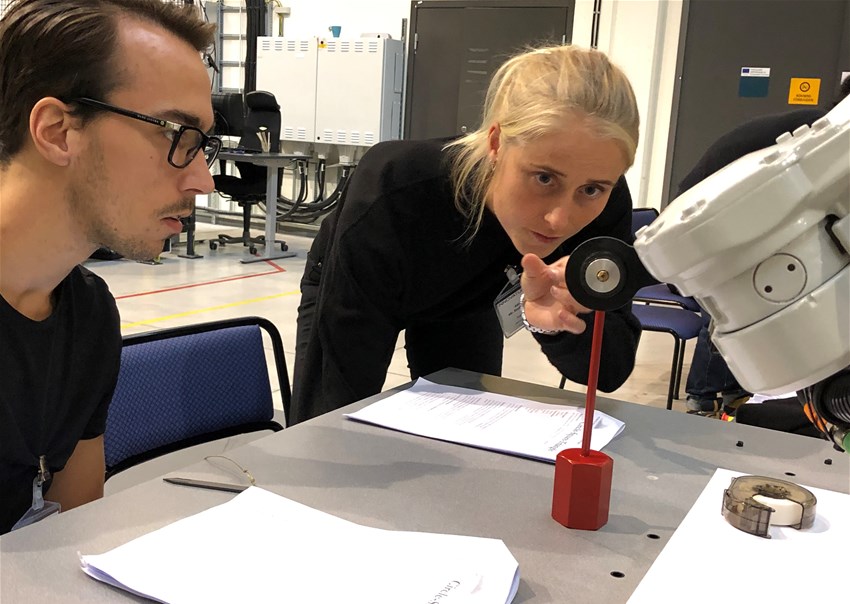Astrid studying for her master’s in Robotics and Automation from Germany
06 Nov 2019
What is a smart way to program a robot? That’s one of many laboratory exercises conducted by 55 students studying robotics and automation at University West. All of them have chosen to study for their master’s degree through the newly established distance learning programme. "It suits me perfectly because I currently live in Germany and want to expand my knowledge on an advanced level", says Astrid Bodin.

How do you get the robot to draw a triangle? Astrid Bodin and her fellow coursemate Benjamin Byman write computer code together during a laboratory session at the Production Technology Centre in Trollhättan.
The first meeting “in real life” between the students consists of an intense week filled with laboratory exercises and lectures. They study from their respective hometowns throughout Europe. Most of them also have a job on the side. Astrid Bodin has just finished working for Perstorp Oxo in Stenungsund, and now lives outside Frankfurt with her boyfriend who is a professional handball player in the German league.
– My German needs to improve before I can apply for jobs here. In the meantime, I am taking the next step in my engineering career by studying for a master’s degree. Initially I was looking for an education in mechanics but instead I found this two-year programme within robotics and automation. It’s just as interesting, says Astrid who has a degree in mechanical engineering from the USA.
Real life meetings are a big plus
Being a long-distance student is new to her and has been a challenge.
– You need to be structured and plan your studies well. Being on campus twice during the first semester and meeting the teachers and fellow students is a big plus. Besides getting to know each other, it’s also fun to put what we learn into practice.
The schedule for the week consists of several laboratory exercises at the Production Technology Centre. Students learn programming on robots provided by the multinational corporation ABB.
Laboratory exercises in focus
– We’re happy that ABB lets us borrow these robots during the on-campus week, says Anders Appelgren, responsible for the Master’s Programme in Robotics and Automation. That allows us to split the laboratory sessions into two groups. The heavy focus on practical applications is what makes this programme unique. Further down the road the students will conduct laboratory sessions at home on small computers called Raspberry Pi.
Many applicants
– We have had many applicants to the long-distance master’s programme, so it appears to be one that is sought-after. Being able to conduct your studies from home makes it possible for more students to deepen their knowledge on an advanced level. That could be an interesting option for engineers who have gone on to employment and who want to strengthen their degrees, but do not live in Trollhättan.
As for the future, Astrid is open to several fields of work.
– It would be interesting to participate in research connected to the planned voyage to Mars in 2033. I am also interested in working with sustainable technology for developing countries. What I learn in this programme seems to be applicable within a variety of different fields.


